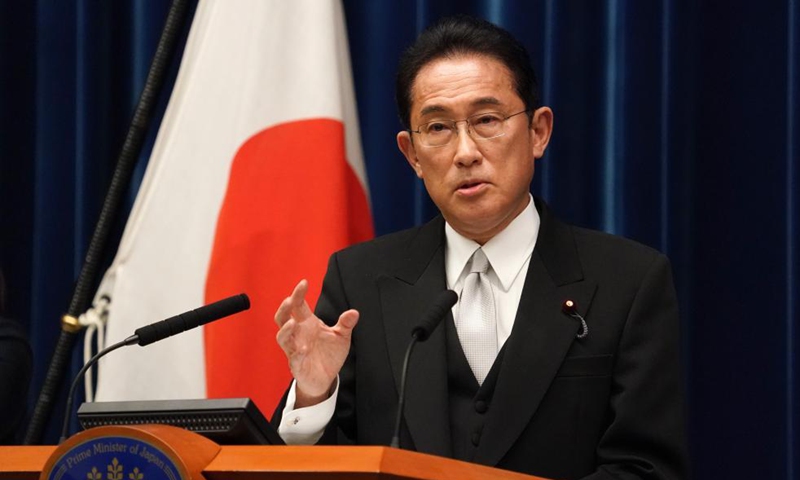China protests Japan’s war-linked shrine visits and offerings

Chinese Foreign Ministry on Thursday lodged serious protests with the Japanese side after Japanese leaders and lawmakers visited and sent offerings to the notorious war-linked Yasukuni Shrine on Thursday as the country marked the 79th anniversary of Japan's surrender in World War II.
Lin Jian, a spokesperson for the ministry urged Japan to stay prudent on historical issues such as the issue of the Yasukuni Shrine and make a clean break with militarism.
According to the Kyodo news, during a memorial ceremony Thursday, Emperor Naruhito expressed his "deep remorse," while Japanese Prime Minister Fumio Kishida did not mention Japan's wartime aggression in Asia in his speech.
Despite Kishida not visiting the notorious shrine in person, he sent a ritual offering to the notorious Yasukuni Shrine on Thursday, a symbol of Japan's past brutal militarism, for three consecutive years.
Several ministers visited the shrine, including the hawkish economic security minister Sanae Takaichi, defense minister Minoru Kihara and economic revitalization minister Yoshitaka Shindo. Some LDP lawmakers, including former environment minister Shinjiro Koizumi and former economic security minister Takayuki Kobayashi, also visited the shrine.
According to Kyodo, Takaichi, Koizumi, Kobayashi are considered potential candidates in the forthcoming LDP leadership race after Kishida's recent announcement that he plans to step down.
The Yasukuni Shrine honors 14 convicted Class-A Japanese war criminals from World War II. Visits and ritual offerings made by Japanese officials to the controversial shrine have consistently sparked criticism and hurt the feelings of the people of China, South Korea and other countries brutalized by Japan during the war.
Lin said that the Yasukuni Shrine, where World War II Class-A war criminals are honored, is a spiritual tool and symbol of the wars of aggression waged by Japanese militarists. What some Japanese political leaders did on the issue of the Yasukuni Shrine once again reveals an erroneous attitude toward historical issues.
Facing up to and deeply reflecting on the history of aggression is an essential prerequisite for Japan to establish and develop friendship and cooperation with its Asian neighbors after World War II, Lin said.
"Japanese politicians seem to be in a race to see who is more extreme and right-wing," said Lü Chao, the director of the Institute of US and East Asian Studies at Liaoning University, "their visits of Yasukuni Shrine are a collective publicity stunt to gain political interests."
But for the international community, Yasukuni Shrine visit is a provocation against Japan's taboo of or the Pacifist Constitution and the international order established after World War II, Lü said, "It is also a provocation of denying the history against countries which have been invaded by Japan."
China on Thursday marked the 79th anniversary of Japan's surrender with patriotic events at multiple sites including the Memorial Hall of the Victims in the Nanjing Massacre by Japanese invaders. China's state-run media have also released commemorative posters on social media, saying that China will not forget the suffering and sacrifice of martyrs in resisting invaders.
The South Korean foreign ministry on Thursday expressed "deep disappointment and regret" over the fact that responsible leaders of Japan once again sent offering to and paid respect at the Yasukuni Shrine, and urged Japanese leaders to squarely face history and demonstrate through action their humble reflection and sincere remorse.
Japan's negative and erroneous perceptions of its aggression and colonial history are deep rooted, and the country has not completed a thorough severing of its past militarism, Xiang Haoyu, a research fellow from the China Institute of International Studies, told the Global Times on Thursday.
Japan's biggest problem is that right-wing politicians are trying to win popular support for breaking the Pacifist Constitutional taboo and expanding the military by stirring up so-called threats from neighboring countries and creating geopolitical confrontations in Asia with the US, Xiang stated.
Japan is embarking on a dangerous path of radicalization, which should arouse great vigilance of the international community, especially Asian countries that have suffered from the brutal aggression of Japanese militarism, Lü said.
Ahead of Japan's surrender anniversary, Hideo Shimizu, a former member of Unit 731, the notorious Japanese germ-warfare detachment during World War II, identified the crimes of the Japanese army on Tuesday at the site where he served 79 years ago in Northeast China's Harbin.
Citing sources, Kyodo said on August 10 that a cross-party group of Japanese lawmakers is planning a visit to China in late August. Led by Toshihiro Nikai, a House of Representatives member and a heavyweight in the ruling LDP, the group is dedicated to promoting friendly China-Japanese relations.
On historical issues, China has always kept the Japanese militarists who waged the war of aggression separate from the ordinary people, and has been making positive efforts to safeguard the overall China-Japan relations and the friendship between the two peoples, Xiang said.
Fundamentally speaking, the future of China-Japan relations depends on whether the Japanese politicians could re-establish a correct, objective and comprehensive perception of China, and pursue a positive policy towards China, rather than a one-sided negative rendering of the "China's threat," Xiang noted.